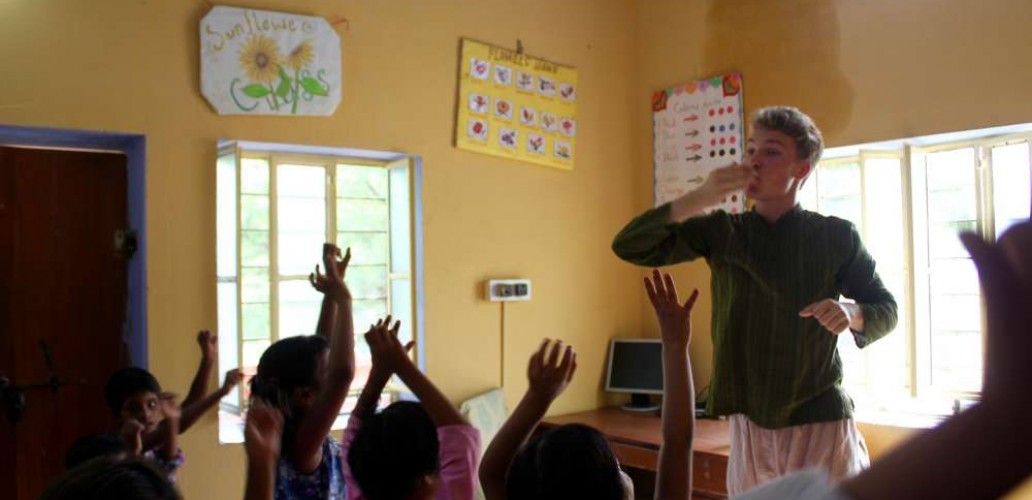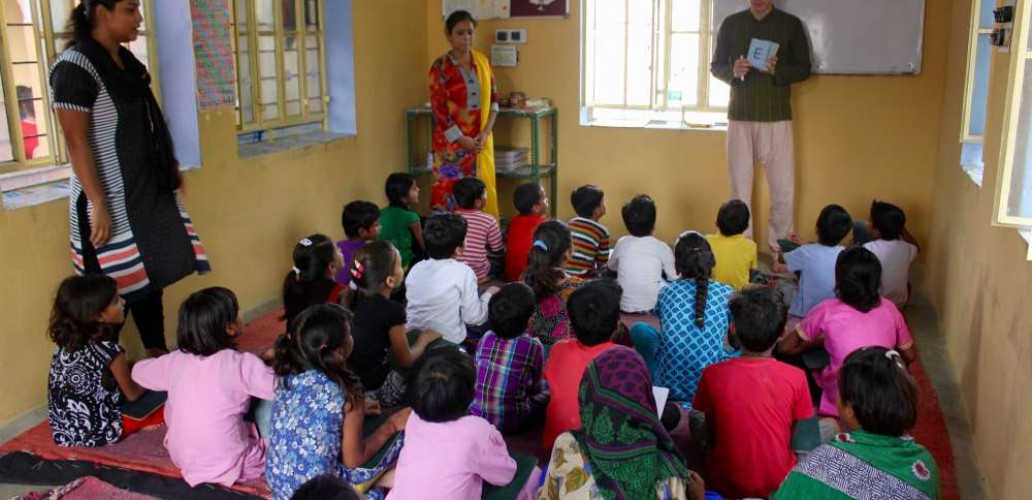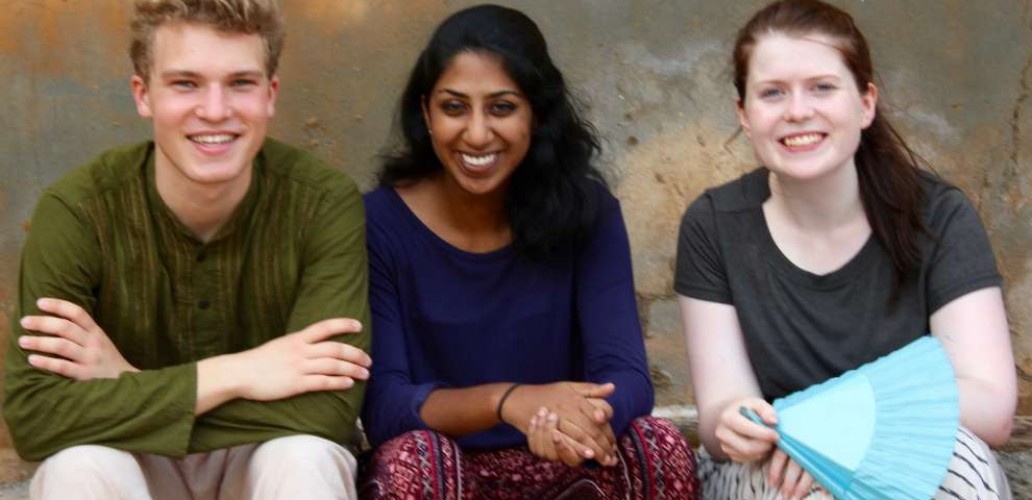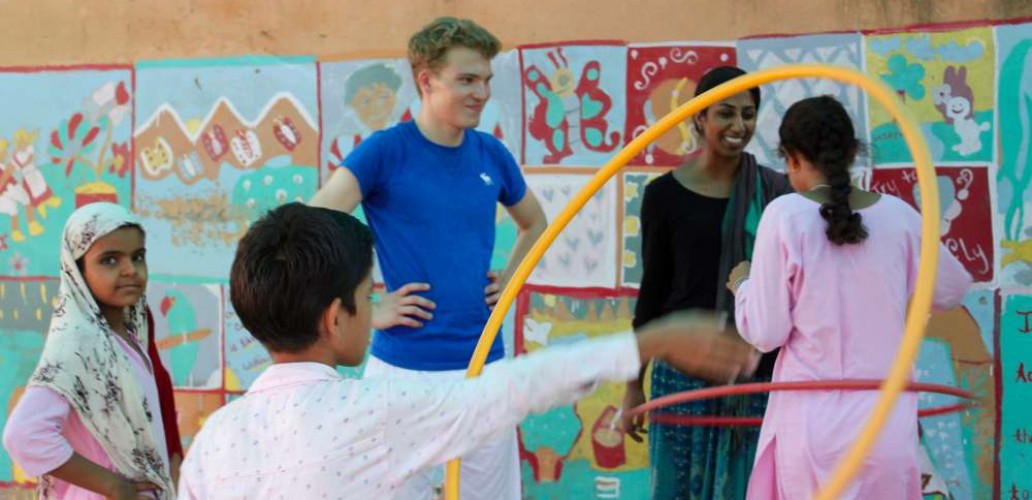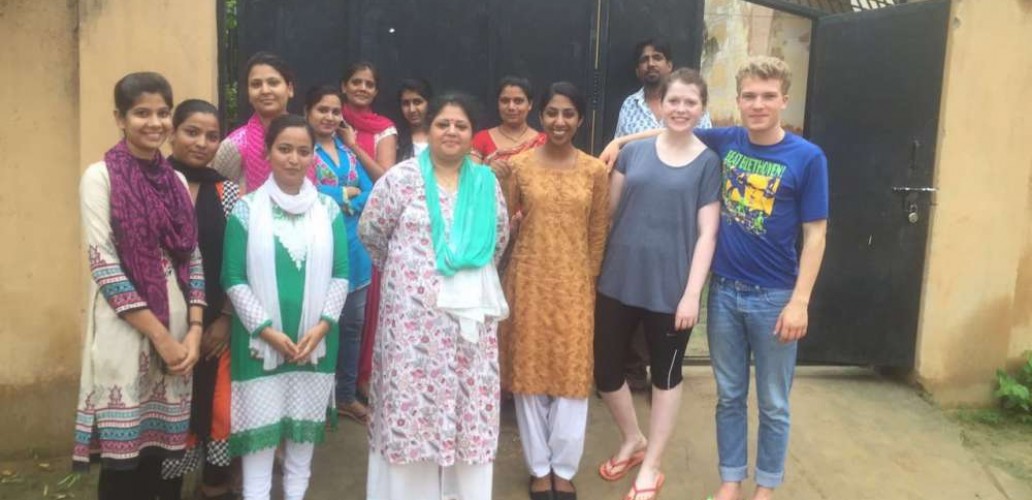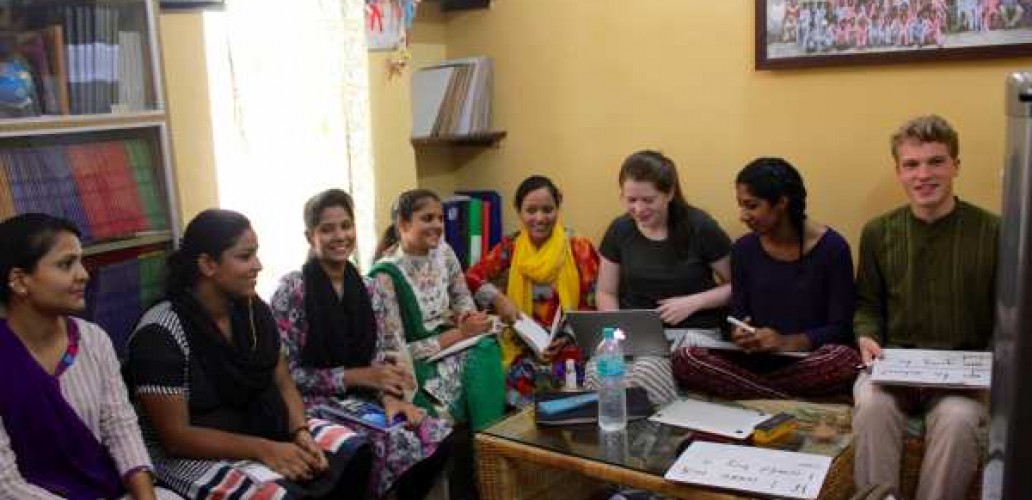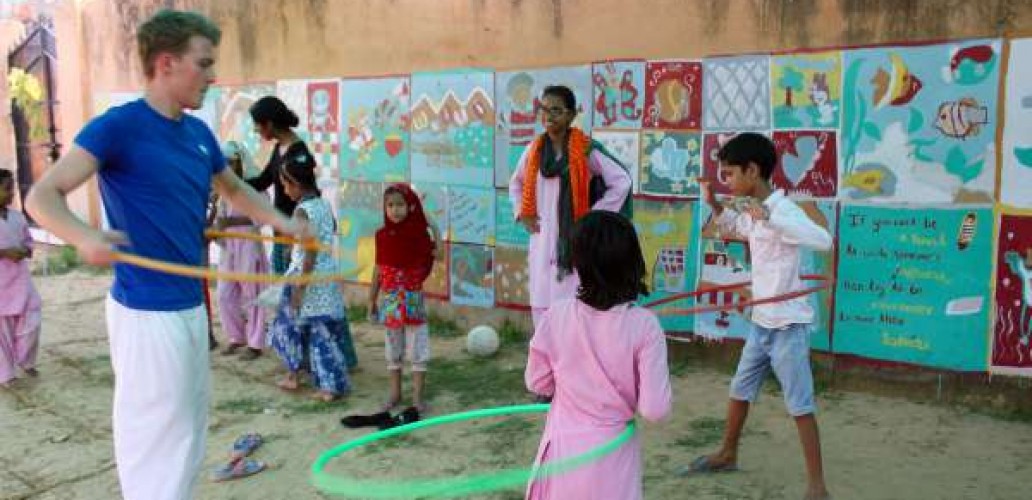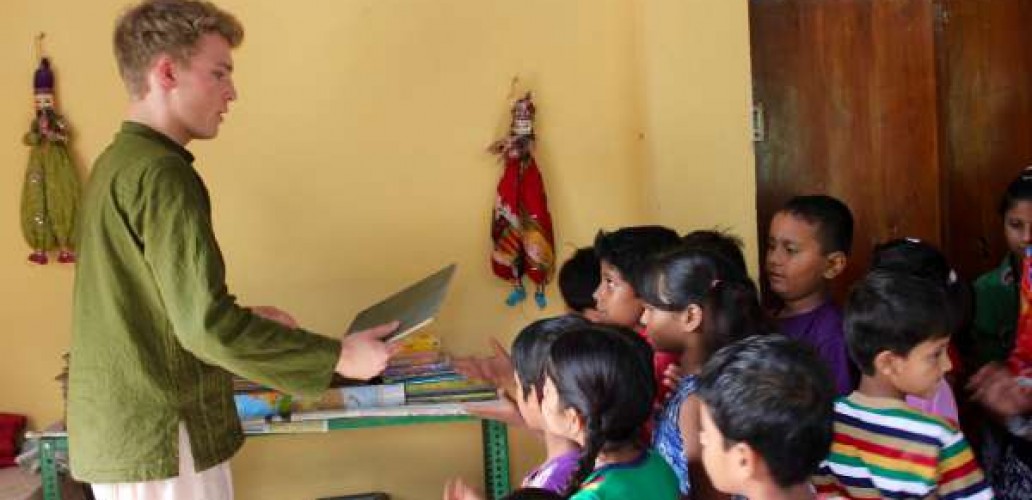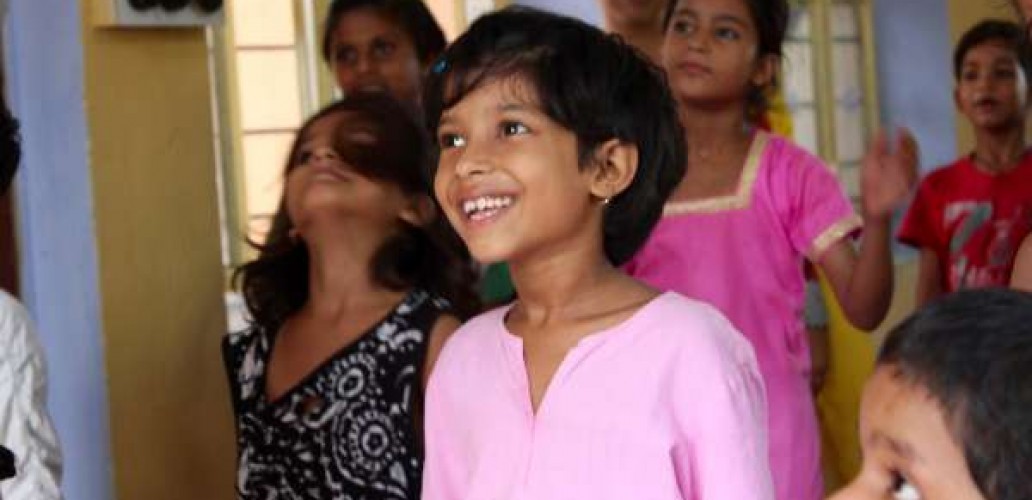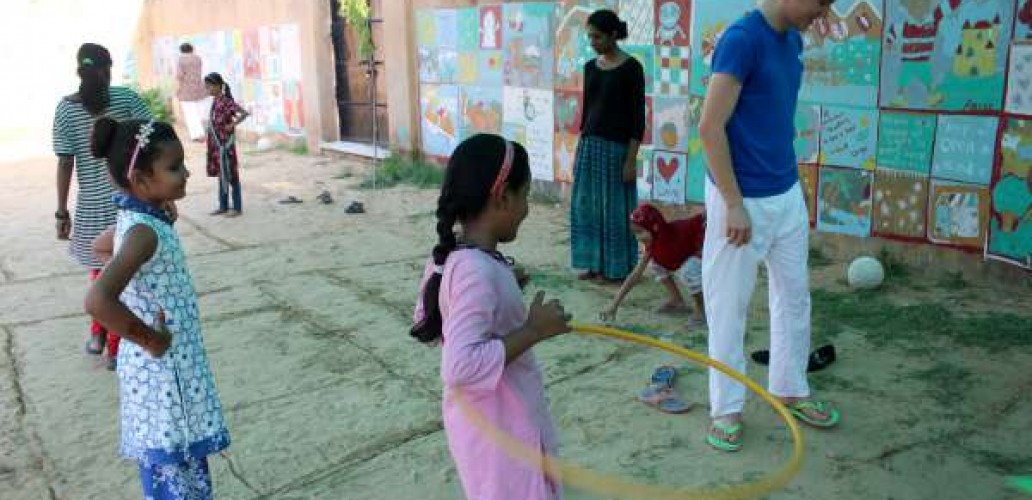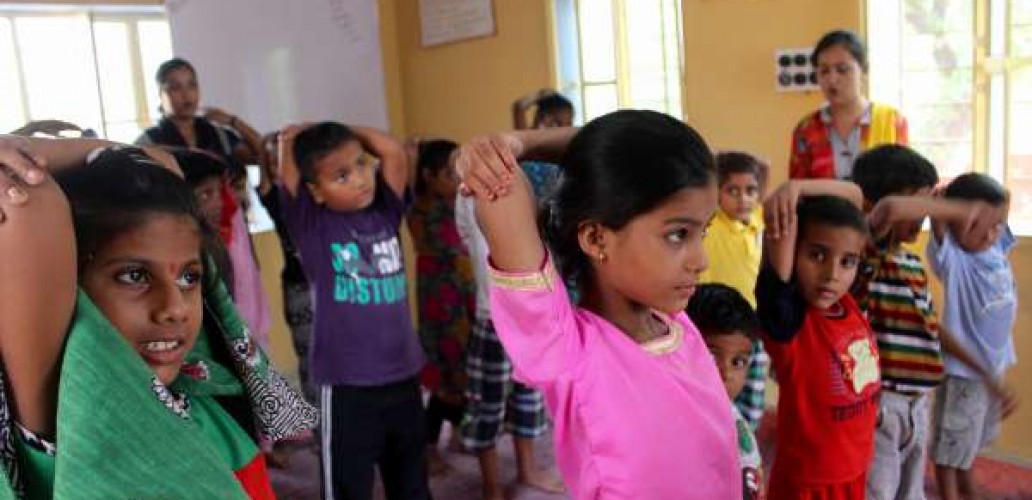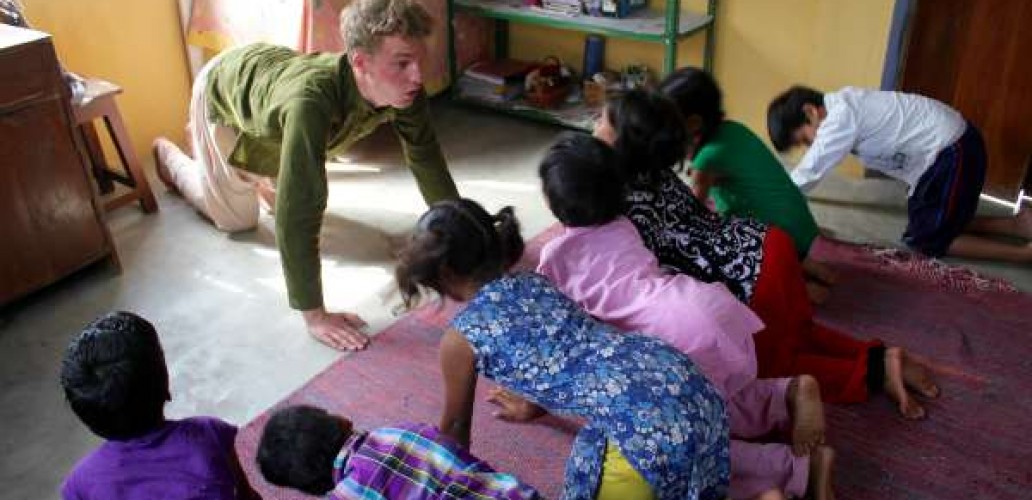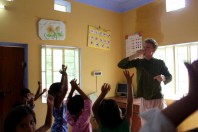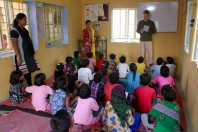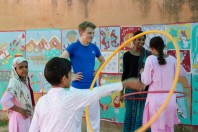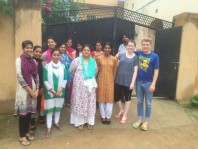Field Internship at Tushita Foundation India
By Markus Specht
Tushita Foundation was founded as a Corporate Social Responsibility (CSR) project by the eponymous Tushita Travels Ltd. in 2009. Tired of witnessing tourists, inspired by a desire to help, engage in inappropriate behaviour, giving pens and candy to children on the street, the Indian owners of Tushita started looking for an NGO to support and direct travellers to. When they finally stopped searching, they had decided to create their own organization; not a school, not an orphanage, but a home of learning and empowerment, a place that belonged to the children and their families, where they would learn with fun and grow in self-assurance; a place where religious, social and racial divides would be washed away by the joy of learning and the power of tolerance. “Our motivation stemmed from an unwavering belief in the universality of human values, irrespectively of caste, creed, and colour. We realized that in the small, connected world we are living in, we could humbly make a difference,” says Veenaji Rathore, the soul of the Foundation.
So far so good, in theory. But how have these lofty ideals been put into practice? How does Tushita differ from other kinds of volunteering projects? An afternoon activity for the children, the Foundation is at the heart of the community and provides an invaluable service to the families of the village. When they come after their regular school, the children rely on us volunteers, as we are often the actual teachers in class. Inviting undergraduate students from the best universities in the world to teach and share their passions with the children, Tushita Foundation creates inextricable ties between the local population and people from all over the globe.
Not only do we interact with three classes of children every day, but we also have a session with the teachers, all of them young women from the village who are reshaping their identity by becoming teachers and thus role models for girls in their communities. These sessions have proved to be one of the most valuable aspects of the internship experience for me.
On a typical day, the volunteers (Kate from Oxford, Zaynab from Princeton, and me) go to the Foundation at noon. Teacher session then takes places for 90 minutes, after which everyone has lunch together. At 2pm, the children arrive and each volunteer teaches his or her class for three batches, where each batch takes 75 minutes. At six, there is playground time with all children who are still there and afterwards, the volunteers and teachers leave for the day. Saturday is devoted to playground time only.
Field Internship: Inventory of Skills Developed
Having taught English before, I thought this would be an experience I would be very comfortable with. While I did have fun, the lessons also challenged me, however.
I had to solve many ‘problems’ that came up while working together with the children on their language skills. First of all, I realized that I needed to teach words and writing in a different manner than it is taught in Indian Government schools in order for the children to really benefit from their experience here. Therefore, I started teaching phonetics – especially in the second batch that consisted almost exclusively of children that were new to the Tushita Foundation and only ever had the experience of Indian Government schools. I solve our issues there by dividing the incredibly large group of children into three circles. As there were two teachers with me in the class, every circle had a teacher. I felt I was thus assuring that no one felt left behind, on the one hand, or bored, on the other hand. It was a little distracting to have three simultaneous ‘lessons’ in one room, but the situation improved in my opinion. After a few days, I noticed a positive change in the atmosphere in the second batch. While it was quite a struggle at the beginning because everyone was quiet and hard to excite, it soon turned into complete chaos. After introducing a few changes, however, we were then at a new stage where those students that had been very shy, were now excited to learn and to participate in games while those that had always been interrupting and yelling quietened down a bit, making the overall atmosphere more like those in the first and the third batch. It was great to see that, even though it took a month, the students were getting acclimatized to life at the Tushita Foundation.
As we focused on a specific area of language learning, namely speaking, I learned a valuable lesson concerning teaching. When we went around the circle and asked each others’ names, age, favourite animals, etc., I caught myself wanting to correct small mistakes made by the children (leaving out articles or prepositions, for instance). I did, however, mostly try to ignore that urge and let the children speak as long as what they wanted to say was intelligible. I feel that it would not benefit students that are very shy and still trying to figure out a language if I corrected them constantly and thus interrupted their speaking. An advanced speaker, who makes mistakes and does not see them as mistakes, must be made aware of it, but only if the speaker is advanced enough to make use of criticism. In teacher session, for instance, I made a clear distinction between correcting advanced teachers, on one hand, and not correcting so much the assistant teachers, on the other hand.
Dividing the teacher session as well, I focused on grammar with the assistant teachers while the other volunteers were trying to work out the details of the TEFL method together with the teachers. I was very happy to do grammar with the two, not only because they put a lot of effort in it, but also because I really like grammatical structures and making someone realize how easy it is once you get the hang of it. However, I soon realised that I had tried to cover way too much ground in just a single lesson. While I had thought we could do a sort of review of the tenses, it turned out that we had to start from the very beginning – including clarifying what nouns, verbs, and adjectives are. Even though this was frustrating at times (because I had not been aware of the fact that this would be necessary), we were figuring it all out together and ended up being very successful.
Surprises
On a personal level, one day something interesting and a little disconcerting happened during playground time. One of the girls in class with older students, Sana, talked to me for a while and at some point wrote the word ‘love’ in the sand. When I asked her what she meant by that, she responded by writing the word ‘mother’ next to it. It turned out that she was saddened by her mother’s apparent lack of love for her, as she explained. Trying to explain to her that every mother loves her children, even though she might not show it sometimes, I could tell she wasn’t convinced. She told me that she had somehow let her mother down and that her mother didn’t love her anymore. Not wanting to dig deeper, I told her that many people struggle with their families, which is why friends – ‘the family that you choose’ – exist and how everyone at the Tushita Foundation loves her. She was cheered up by the anecdote I told her about Zaynab, my co-volunteers, telling me on her first day that there was one quite outspoken, open-minded, and happy girl in her class: Sana.
Two more anecdotes about my personal exchange with the children struck me as well: the first one is about one of the teacher’s niece Falak who was a student in my class. She is a very nice girl but usually keeps her head in the clouds, not disturbing anyone but not really paying attention either. One day, however, there were only six people in the first batch and I decided to take advantage of the situation and we read the book ‘Trunk Trouble’ together. The story of how three elephants get their trunks tangled up and all the animals try to help untangle them captivated her completely and I have never seen her so engrossed by anything we had ever done before, answering questions promptly, correctly and most of all excitedly. This has shown me again how different children learn in different ways and how important it is to try to cater to everyone’s needs.
Second story: Diprianshu, the youngest son of the lady who cooks at the Foundation, is only three years old but is part of my first batch. He is usually very quiet and everything clearly goes over his head, but one day I spent a lot of time with him during class while the others were ‘speed-dating’ (it’s a language exercise) and I managed to get him out of his shell. Finally, he repeated a few sentences in English after me, did animal sounds (quite convincingly) and gave me a big smile. He made my day!
Our relationships with the teachers were also very important to us as volunteers, and I learned so much from these smart and kind ladies. Once, for example, when we asked the teachers to write a few paragraphs on an issue in their society they would like to change, our proposal was met with a level of candour and emotion we had not expected. 24-year-old Ruksar wrote on how unfair it is that girls have to move out of their homes and into their in-laws’ place when they get married, prompting a heated debate. The teacher of my group, Rahela, talked at length about reservations for low caste Indians in government jobs and how she feels that this works to the disadvantage of general caste Indians. Besides this extraordinary insight into Indian society and its ailments, one of the most valuable lessons I have learned is to acknowledge problems in other societies without putting the place you’re from on a pedestal. There is much to change in Europe as well and while the teachers talked about what they liked in other countries, I am now realizing that we Europeans can learn from India just as much as they from us – maybe in other areas, but nevertheless.
It is in this context that I was able to identify several topics which I deem appropriate as topic of a research for my project in social sciences. First of all, I thought it was very interesting to consider the power structures in Indian society from a sociological point of view. It is much more common in India to have “servants”, domestic help (we had a cook and driver, for instance), and yet the way people talk to each other differs from what I have experienced in the West. While this relates probably more to my very personal observations during the internship, two other topics came to my mind after reading extensively about Indian politics, culture, and society:
- The religious divide in the country and how populist parties turn it into their own advantage. Interestingly, the Tushita Foundation is in a village that is approximately half Muslim and half Hindu. This demography is mirrored in the student body as well as the teaching staff. We volunteers, however, not being accustomed to the tell-tale signs of religious affiliation one might spot, did not know who was Muslim and who was Hindu at the beginning because the relations between children and also adults of different faiths was not in any way different from the relations between members of the same community. In my opinion, this shows how projects like the Tushita Foundation must be repeated again and again to forge understanding between different people and religious groups in Indian society.
- The foundation is of course first and foremost a place of education for the children and I think in a country like India, this is one of, if not the, crucial factor for economic growth, sustainable development, and all kinds of advances in society. Only by advancing education can all strata of society be a part of the success story of the world’s largest democracy and fight against the many evils that persist in its society. I think it would be immensely interesting to do a research project into which policies would best advance education and how feasible they would be.
All in all, the internship introduced me both to big questions about issues in society, but also helped me to advance so much on a personal level. What I really came to appreciate about the Foundation is the fact that it is learning environment for everyone involved – the children, the teachers, the volunteers, and even Virendraji, the driver, who joined grammar lesson and Kanchan, the cook, who sits in on my class learning the how to write English words.
One of my favourite days at the Foundation was when we celebrated Rakhi together. Rakhi is a Hindu festival celebrating the love and duty between brothers and sisters. Everyone dressed up in saris and Veenaji, our “boss”, got all the boys, including me, new kurtas and pants. We took lots of great pictures, making the traditional bracelets together with the children. The highlight was the ‘official’ ceremony in the office that included rice being thrown on my head. At some point, I could barely move my arms because of all the rakhis (bracelets) that the girls (my “sisters”) tied on my arms, but it was so worth seeing the joy in the children’s faces. After we had given them some savoury and sweet snacks and they had gone off to the playground, we spent some quality time with the teachers and Veenaji, singing and dancing in the office – what a great ending for a perfect day!
When the time came to go back to France, I really dreaded leaving everything in India, but I also enjoyed repeating everything I did with the children and sort of ‘wrapping up’ this chapter of their education at Tushita. I was so very proud of how much they learned, seeing them being able to have an entire conversation in English (as long as the questions remain very straight-forward).

